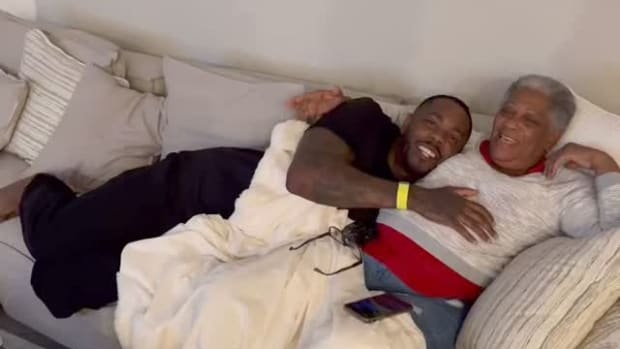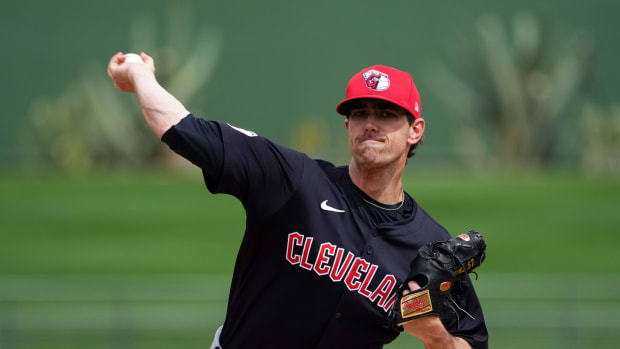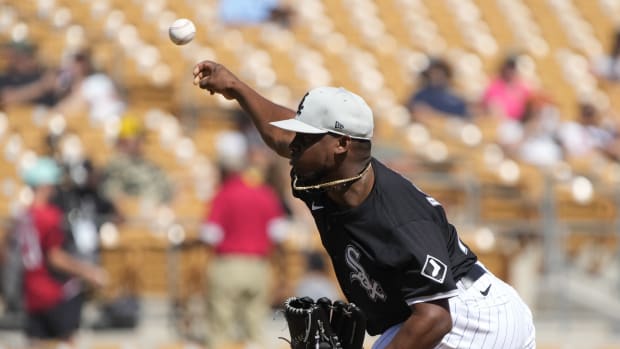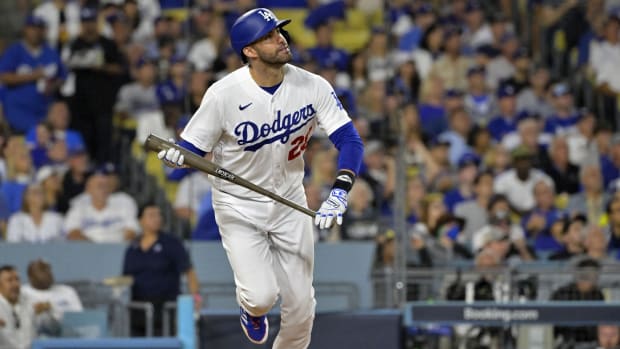The Dodgers Are Still Paying for Their Trevor Bauer Mistake
Editors’ note: This story contains graphic accounts of domestic violence and sexual assault. If you or someone you know is a survivor of sexual assault or domestic violence, contact the National Sexual Assault Hotline at 1-800-656-4673 or the Domestic Violence Hotline at 1-800-799-7233.
Trevor Bauer is gone from the Dodgers, but the mistake of signing him continues to impact them. President of baseball operations Andrew Friedman said last week he expects the team to remain over the first luxury tax threshold this year, a remnant of the reduced suspension ruling by an arbitrator that left the Dodgers on the hook for $22.5 million in salary to Bauer, or $24.5 million in dead competitive balance tax money.
With plans to fold young players into their roster this year from a flush farm system, the Dodgers considered an opportunity to get under the $233 million first tax threshold and reset their tax rate as a first-time offender for 2024. But after the Bauer ruling, and after multiyear deals last week for Miguel Rojas and Tony Gonsolin, they have crept to $238 million.
Sitting barely above the threshold as a repeat tax offender is the worst possible position. You either a) reset the luxury tax rate by getting under the threshold, thereby saving millions, as they did in 2018, when they won 12 fewer games and still won the pennant, or b) blow past it. You don’t tip-toe over it as a multiple-time offender—a small gain with a huge tax implication coming in ’24, when the Dodgers will try to sign Shohei Ohtani and retain Julio Urías.
Tax rates are set by payrolls at the end of the season. Friedman said he does not anticipate trading salary to limbo under the threshold. That means the Dodgers are more likely to add payroll during the season, especially because the Padres right now have the better team on paper.
MLB suspended Bauer last April for two full seasons after a nine-month investigation found that he had violated the league’s domestic violence policy. An arbitrator ruled on Dec. 22 to reduce that suspension to 194 games, essentially giving Bauer credit for time served—he was placed on administrative leave shortly after a San Diego woman filed a petition seeking a restraining order against him on June 29, 2021—and restoring all but 50 days of his pay this season. The suspension remains the longest for domestic violence in league history. The Dodgers designated Bauer for assignment 14 days after his reinstatement and released him after no team claimed him off waivers. He is still a free agent.
The San Diego woman said Bauer assaulted her during two encounters of rough sex that began as consensual. She said he choked her until she lost consciousness, sodomized her and punched her hard enough that she sought treatment at a hospital. “I felt like my soul left my body, and I was terrified,” the woman said during a hearing in August 2021, according to the Associated Press. Bauer and his representatives have denied the allegations.
The woman was denied the restraining order after the August hearing. The court ultimately found that the woman’s claims were “materially misleading,” and Los Angeles Superior Court Judge Dianna Gould-Saltman said the only evidence of anything happening while the woman was unconscious was from being “hit on the butt.” In February 2022 the L.A. County district attorney’s office announced it would not press charges against Bauer. The joint domestic violence agreement with the players association gives MLB the right to suspend a player even if charges have not been filed.
ROSENBERG: How to Judge Trevor Bauer
As Sports Illustrated previously reported, the league also looked into allegations made by at least two other women, who The Washington Post reported shared similar accounts about Bauer. He and his representatives have denied those, as well. Authorities did not press charges in either case.
The Post reported that all three women initially participated in the arbitration but that one, in Cleveland, dropped out last summer, citing “personal and family matters.” The Post also reported that the third woman, who is in Columbus, Ohio, “described what she saw as a last-ditch effort by Bauer to embarrass or intimidate her before she testified. She said [his attorney’s] private investigator contacted former acquaintances with no relation to the case to ask about her dating history, including whether she had past relationships with professional athletes.”
Bauer has sued the San Diego woman—as well as at least two media outlets that reported on the allegations—for defamation. In July the San Diego woman countersued him, alleging battery and sexual assault. In November, a judge denied Bauer’s petition to dismiss the countersuit.
Two years ago this week, the Dodgers signed Bauer to a three-year, $102 million contract. The move was controversial at the time due to Bauer’s history of harassing people online and promoting harmful conspiracy theories.
In January 2019, he responded to a Texas State student on Twitter, trolled her for more than a day and exposed that she had consumed alcohol underage. His followers tormented her to the point that she told USA Today she spent the next three days crying.
In a tweet posted Nov. 10, 2016, Bauer echoed a quote falsely attributed to philanthropist George Soros rooted in antisemitism. He amplified the racist conspiracy theory that former President Barack Obama was not born in the United States in a tweet from Feb. 10, 2017. During a start in May ’18, he carved “BD 911” into the Wrigley Field mound—which afterward he claimed said “BD 91.1” and was not a reference to the "Bush Did 9/11" conspiracy theory.
In the end, the Dodgers will wind up paying him $61 million for 17 starts. The overall cost will be much greater than that.



































